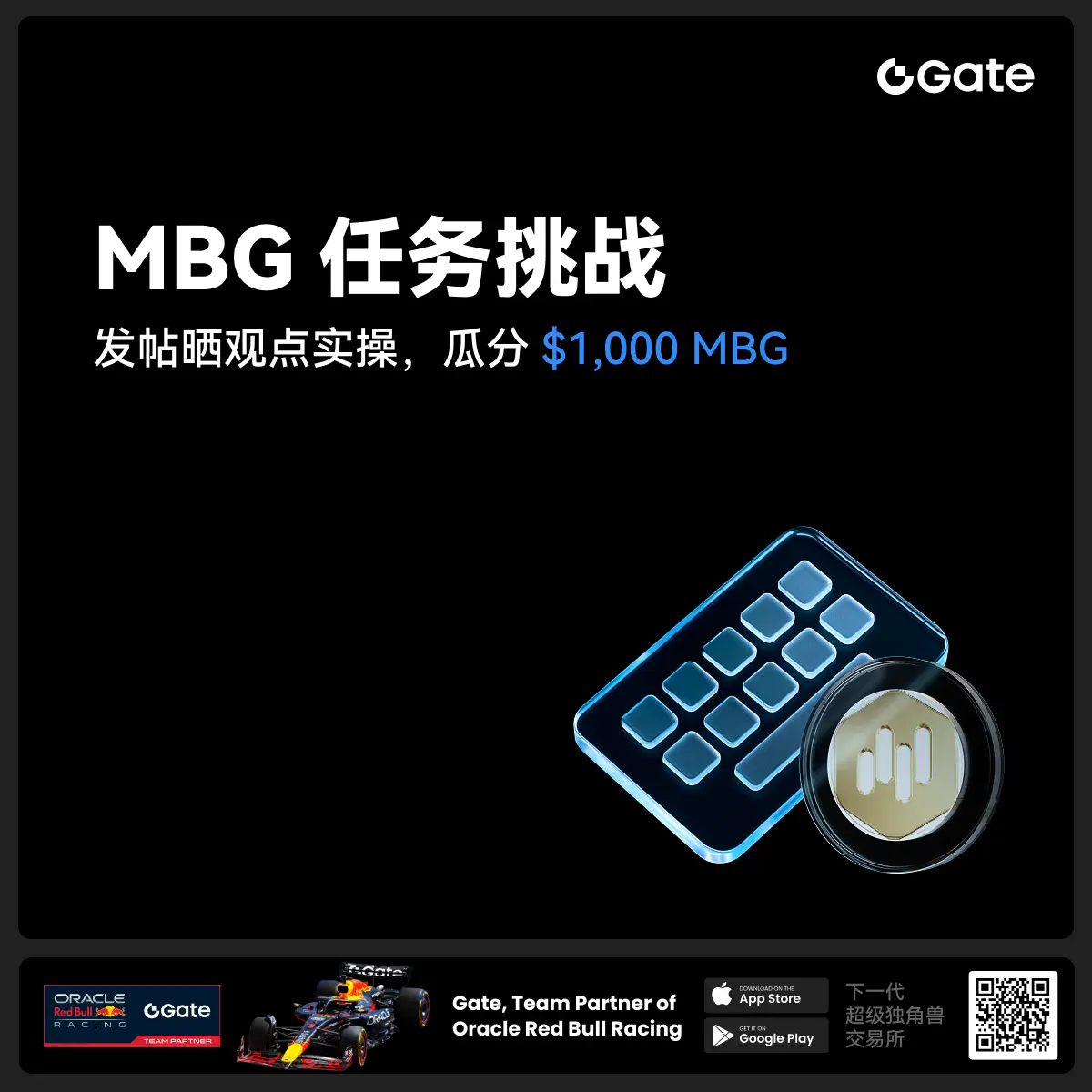- 話題1/3
17711 熱度
26027 熱度
20482 熱度
48214 熱度
19885 熱度
- 置頂
- 📢 Gate廣場 #MBG任务挑战# 發帖贏大獎活動火熱開啓!
想要瓜分1,000枚MBG?現在就來參與,展示你的洞察與實操,成爲MBG推廣達人!
💰️ 本期將評選出20位優質發帖用戶,每人可輕鬆獲得50枚MBG!
如何參與:
1️⃣ 調研MBG項目
對MBG的基本面、社區治理、發展目標、代幣經濟模型等方面進行研究,分享你對項目的深度研究。
2️⃣ 參與並分享真實體驗
參與MBG相關活動(包括CandyDrop、Launchpool或現貨交易),並曬出你的參與截圖、收益圖或實用教程。可以是收益展示、簡明易懂的新手攻略、小竅門,也可以是現貨行情點位分析,內容詳實優先。
3️⃣ 鼓勵帶新互動
如果你的帖子吸引到他人參與活動,或者有好友評論“已參與/已交易”,將大幅提升你的獲獎概率!
MBG熱門活動(帖文需附下列活動連結):
Gate第287期Launchpool:MBG — 質押ETH、MBG即可免費瓜分112,500 MBG,每小時領取獎勵!參與攻略見公告:https://www.gate.com/announcements/article/46230
Gate CandyDrop第55期:CandyDrop x MBG — 通過首次交易、交易MBG、邀請好友註冊交易即可分187,500 MBG!參與攻略見公告:https://www.gate.com/announcements
- 🎉 Gate廣場“星火計劃”入駐KOL突破1000人!
💥 創作者生態迎來全面爆發期!
📈 上首頁、拿獎勵、贏影響力,你還在等什麼?
💰 現金激勵 ✔️
🚀 流量扶持 ✔️
👑 專屬認證 ✔️
從0到1000,我們只用了短短數周,Gate廣場正在成爲Web3內容風暴眼⚡
你發布的不只是內容,而是下一個“爆款機會”!
🌟 加入星火計劃,開啓你的爆發之路!
👉 https://www.gate.com/announcements/article/45695
#GateSquare # #星火计划# #内容创作者新纪元 # #KOL集结令#
- 📢 #Gate广场征文活动第三期# 正式啓動!
🎮 本期聚焦:Yooldo Games (ESPORTS)
✍️ 分享獨特見解 + 參與互動推廣,若同步參與 Gate 第 286 期 Launchpool、CandyDrop 或 Alpha 活動,即可獲得任意獎勵資格!
💡 內容創作 + 空投參與 = 雙重加分,大獎候選人就是你!
💰總獎池:4,464 枚 $ESPORTS
🏆 一等獎(1名):964 枚
🥈 二等獎(5名):每人 400 枚
🥉 三等獎(10名):每人 150 枚
🚀 參與方式:
在 Gate廣場發布不少於 300 字的原創文章
添加標籤: #Gate广场征文活动第三期#
每篇文章需 ≥3 個互動(點讚 / 評論 / 轉發)
發布參與 Launchpool / CandyDrop / Alpha 任一活動的截圖,作爲獲獎資格憑證
同步轉發至 X(推特)可增加獲獎概率,標籤:#GateSquare 👉 https://www.gate.com/questionnaire/6907
🎯 雙倍獎勵機會:參與第 286 期 Launchpool!
質押 BTC 或 ESPORTS,瓜分 803,571 枚 $ESPORTS,每小時發放
時間:7 月 21 日 20:00 – 7 月 25 日 20:00(UTC+8)
🧠 寫作方向建議:
Yooldo
- 🎉Gate 2025 上半年社區盛典:內容達人評選投票火熱進行中 🎉
🏆 誰將成爲前十位 #Gate广场# 內容達人?
投票現已開啓,選出你的心頭好
🎁贏取 iPhone 16 Pro Max、限量週邊等好禮!
📅投票截止:8 月 15 日 10:00(UTC+8)
立即投票: https://www.gate.com/activities/community-vote
活動詳情: https://www.gate.com/announcements/article/45974
- 📢 #Gate广场征文活动第二期# 正式啓動!
分享你對 $ERA 項目的獨特觀點,推廣ERA上線活動, 700 $ERA 等你來贏!
💰 獎勵:
一等獎(1名): 100枚 $ERA
二等獎(5名): 每人 60 枚 $ERA
三等獎(10名): 每人 30 枚 $ERA
👉 參與方式:
1.在 Gate廣場發布你對 ERA 項目的獨到見解貼文
2.在貼文中添加標籤: #Gate广场征文活动第二期# ,貼文字數不低於300字
3.將你的文章或觀點同步到X,加上標籤:Gate Square 和 ERA
4.徵文內容涵蓋但不限於以下創作方向:
ERA 項目亮點:作爲區塊鏈基礎設施公司,ERA 擁有哪些核心優勢?
ERA 代幣經濟模型:如何保障代幣的長期價值及生態可持續發展?
參與並推廣 Gate x Caldera (ERA) 生態周活動。點擊查看活動詳情:https://www.gate.com/announcements/article/46169。
歡迎圍繞上述主題,或從其他獨特視角提出您的見解與建議。
⚠️ 活動要求:
原創內容,至少 300 字, 重復或抄襲內容將被淘汰。
不得使用 #Gate广场征文活动第二期# 和 #ERA# 以外的任何標籤。
每篇文章必須獲得 至少3個互動,否則無法獲得獎勵
鼓勵圖文並茂、深度分析,觀點獨到。
⏰ 活動時間:2025年7月20日 17
價值投資大師霍華馬克斯最新備忘錄《無人知曉》:別信專家了,沒人能預測金融末日何時來臨
霍華・馬克斯認為,迄今為止的關稅發展如同足球迷所稱之為的「烏龍球」,隊員不慎將球送入自家球門而造成對方得分的情況。本文源自橡樹資本發表文章,由霍華・馬克斯,橡樹資本聯席創辦人及聯席董事長本人所撰。 (前情提要:價值投資大師霍華馬克斯的最新觀點:你該拋棄幾十年來的舊評估眼光 ) (背景補充:貝萊德CEO投資者信全文:比特幣正蠶食美元儲備地位,代幣化將引領資本革命 ) 2008 年 9 月 15 日星期五,紐約證券交易所收盤後不久,雷曼兄弟突然申請破產的訊息震驚全球。此前,貝爾斯登和美林相繼申請紓困 / 宣告破產,而緊隨其後,瓦喬維亞銀行、華盛頓互助銀行和美國國際集團也相繼陷入危機。於是市場參與者迅速得出結論:美國金融系統正瀕臨崩盤。 局勢已顯而易見(與數日前截然不同),在以下多重因素的疊加效應之下,金融機構可能或將如多米諾骨牌般接連倒塌: (一)金融放鬆監管; (二)房地產狂熱浪潮; (三)非理性的抵押貸款; (四)將抵押貸款結構化為數千種評級虛高的分級證券; (五)高槓杆銀行對這些證券的投資,以及 (六)銀行之間高度關聯而引發的「交易對手風險」。恐慌情緒發酵,市場似乎陷入了無止境的螺旋式下跌。 我當時認為,有必要對這些事態的發展及未來的前景略陳己見,於是在四天後釋出了題為《無人知曉》(Nobody Knows)的備忘錄。我一如既往地承認自己對未來一無所知,但在舊有預期被全盤顛覆的情況下,這種一無所知更勝以往。無人知曉這場螺旋式下跌是否會停止,於我而言更是如此。儘管如此,我的結論是,我們必須假設其最終會停止,因此應當在金融資產價格大幅折價之際大舉加倉。 當時無人敢妄稱自己「知曉」未來,包括我在內。我只能通過推斷得出以下結論: 我們無法篤定末日何時降臨, 縱使知曉末日將至, 我們也束手無策, 若末日最終並未降臨, 為此所作的一切舉措反而會釀成災難, 以及絕大多數時候,末日終究不會降臨。 顯然,上述結論無一建立在知曉未來的基礎之上。但除了將資金投入市場,包括機會七期 B 基金中尚未動用的 100 億美元資金,我看不到更合乎邏輯的選擇。我們設立該基金的初衷,正是為了把握困境債務領域中的重大機遇。而當機遇來臨時,尤其是考慮到我們在困境中能以折價 —— 和驚人的收益率 —— 買入最優質的債務,我們怎能裹足不前?然而必須承認,我們對未來會發生什麼毫無頭緒。 我無法妄言自己能夠分析未來。事實上,我認為「分析未來」這個說法本身就是一個巨大的悖論。未來尚未發生,並始終受到無數複雜、不可量化、難以預知且不斷變化的因素影響。我們可以思考未來,推測未來,但並無可能分析未來,全球金融危機爆發初期當然也是如此。 2020 年 3 月,我沿用了 2008 年那篇備忘錄的標題,撰寫了《無人知曉(II)》(Nobody Knows II)—— 這是我在新冠疫情期間撰寫的首篇備忘錄。文章引用了哈佛大學流行病學家馬克・利普希奇(Marc Lipsitch)的觀點:人們通常基於以下三點做出決策(一)事實依據,(二)從類似經驗得出的有根據的推論,以及(三)觀點或推測。但鑑於當時既無適用於新冠疫情的事實依據,又無類似的經驗,我們僅剩下推測這一選項。 關於 2008 年危機以及我曾親歷的其他市場動盪 —— 包括當下 —— 我想說的是,我的決策並非穩操勝券,行動時亦難消忐忑。投資領域根本沒有確定性可言,在市場轉折和劇烈波動時期尤為如此。我從未確信自己的判斷絕對正確,但只要推理出最合乎邏輯的結論,就必須朝著那個方向邁進。 前景未卜 在我 2 月僅供客戶參閱的備忘錄《回顧 2024》(2024 in Review)中,我曾用「不確定性」一詞概括川普政府的特徵。這位總統的決策思維較之歷任更加難以預測,很大程度上是因為其未必遵循連貫的意識形態,而且常常會進行戰術性的調整和修正。但值得注意的是,長久以來川普一直抱怨美國在世界貿易中遭受不公待遇,而且至少從 1987 年起,他就一直主張支援徵收關稅。儘管如此,即便我們預見到他會加徵關稅,其政策力度仍遠超預期。顯然,市場也始料未及。 上週的事件讓我們想起了 2008 年發生的事件及其引發的全球金融危機。所有規則均被推翻。過去 80 年形成的世界貿易的運作方式可能就此改寫。其對經濟乃至世界整體格局的影響完全無法預測。我們再次面臨重大決擇,卻依然缺乏事實依據和歷史經驗可供參考。真正的無人知曉 —— 本篇備忘錄的大部分內容都將圍繞那些無法確知的事物展開。但我希望它能幫助您釐清思路、評估事態。 我要指出的是,在當前的局勢下,不存在真正的專家。經濟學家雖有分析工具和理論可用,但在此情境下,任何學者或模型得出的結論都無法讓人確信無疑。現代史上從未爆發過大規模貿易戰;因此,所有理論都未經實踐檢驗。投資者、企業家、學者和政府領袖都會提出建議,但他們未必比普通認知的觀察者更正確。眾人皆知的結論顯而易見,比如物價可能會上漲。真正關鍵的隱微真相反而難以洞見。 我堅持認為,即便對於通過預測來應對未來的人而言,單有預測仍是不夠的。除了預測本身,還需要權衡其成真的概率,畢竟並非所有預測都具備同等價值。在當前環境下,我們必須承認預測的準確率必然不及往常。 何以如此?根本原因在於,當前局勢中充斥著大量前所未有的未知變數,而這有可能演變為我們有生之年最重大的經濟變局。這裡不存在所謂的預知性,唯有複雜性和不確定性,而我們必須接受這一事實。這意味著,如果我們執意以確定性甚至信心作為採取行動的前提,我們將會陷入無所作為的僵局。或者說,恕我直言,如果我們自以為做出了確定無疑的決策,那麼我們很可能是在犯錯。我們必須在缺乏確定性的情況下做出決策。 但同樣需要銘記:決定「不採取行動」並不是「採取行動」的反義詞,其本身就是一種行動。不採取行動的決定 —— 保持投資組合不變 —— 與做出改變的決定一樣,都應被審慎考量。被恐慌的投資者視為避險之策的諺語 ——「不接飛刀」和「靜待塵埃落定,柳暗花明」本身並不能用來指導我們的行動。我非常喜歡市場分析師沃爾特・迪默(...